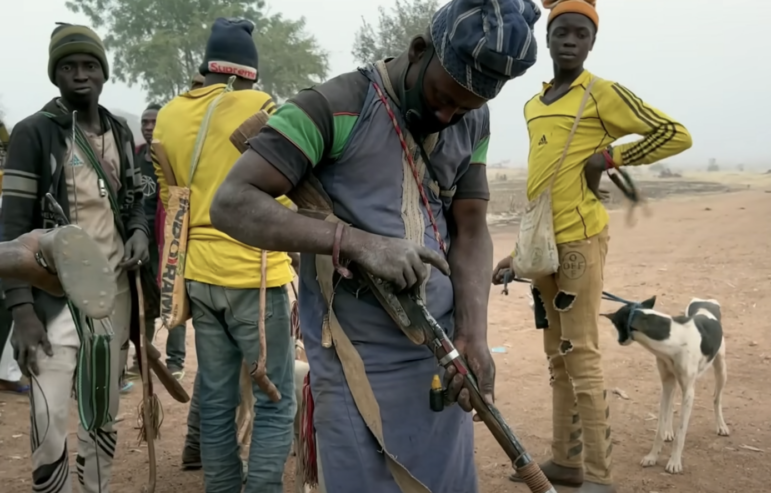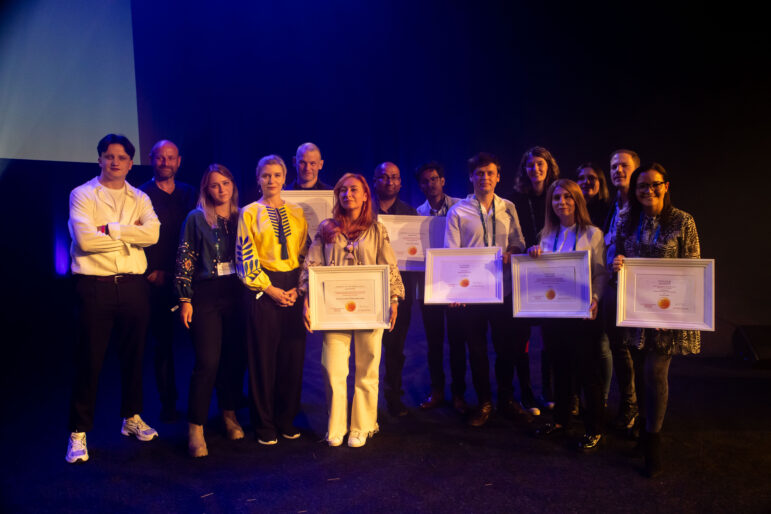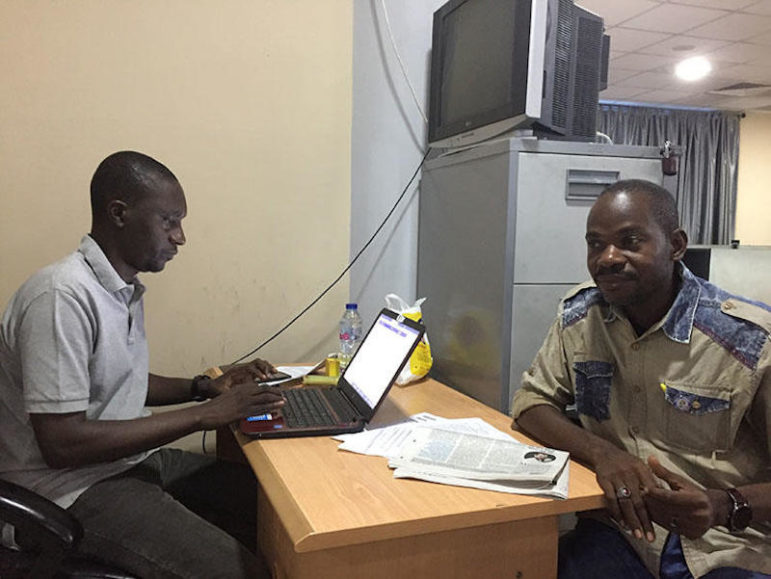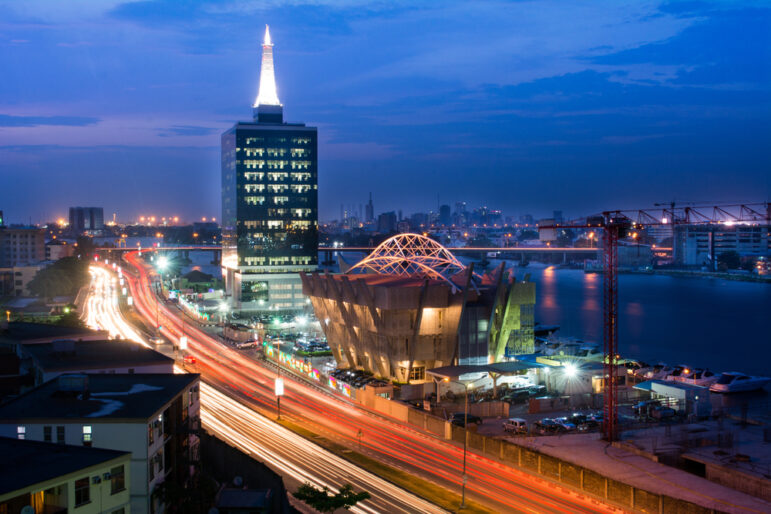

The BBC Africa Eye story on bandit warlords in the northwestern Nigerian province of Zamfara co-won the 2023 Global Shining Light Award at GIJC23. Image: Screenshot, BBC Africa Eye
How One Nigerian Journalist on a Motorcycle Exposed Armed Warlords
Read this article in
What can one intrepid reporter and his motorcycle accomplish?
Yusuf Anka, a 27-year-old Nigerian journalist, spent three years riding into and out of dangerous territory in northwestern Nigeria, investigating armed gangs plaguing his home region for the BBC Africa Eye. The resulting documentary, “The Bandit Warlords of Zamfara,” was recognized at the 13th Global Investigative Journalism Conference as a joint winner of the Large Outlets, 2023 Global Shining Light Award.
For the past five years, armed bandits have been zig-zagging across the region in bikes and open trucks, terrorizing local communities, attacking security posts, and carrying out mass abductions for millions of dollars in ransom.
Anka, who previously worked as a reporter for HumAngle, says he has always wanted a bigger platform to produce a comprehensive investigative story about the armed bandits.
“I was writing but I knew it was not enough in explaining the scale of the crisis in the region,” he recounts. He finally got his chance when the BBC reached out and asked him to do a story on military airstrikes against the armed groups in the region.
“The Nigerian Air Force had bombed a civilian community in 2019,” he recalls. “It was all over the internet and the BBC wanted to do a detailed investigation into that issue and so they messaged me and I started to look for access into the community.”
But Anka said he soon decided to change the focus of the investigation to the backstory behind the conflicts — and how the situation on the ground was much more complicated than it appeared from the outside. “When I visited the communities, I realized that a lot of people are victims and a lot of victims are even perpetrators,” he explains, citing instances of reprisal attacks between communities over ownership of land and cattle routes. “It was a very rapidly shifting balance.”
Establishing Access
Getting access to the bandit leaders was the most difficult part of the investigation, Anka says. For several months, he tried to connect with the warlords leading the ongoing armed militia conflicts in northwest Nigeria.

Yusuf Anka, who was a law student when he reported this story, was raised in Zamfara. Image: Screenshot, BBC Africa Eye
“It took me several months trying to find where to start with phone numbers,” he says. “People would give you phone numbers but would not allow you to speak to them. They don’t know how they would react to a journalist. Sometimes I would call their phone lines and they would block mine. It was a rollercoaster.”
During a government-led dialogue with the bandits in 2020, Anka had the opportunity to embed with one of the communities and someone established access for him to speak with one of the bandits who attended the dialogue meeting. Anka made two visits to one of the bandits’ camps for interviews, but to no avail.
“I went to do interviews, but I was basically the one who was being interviewed all the time,” he explains. “They did their own search online on Google to check my name to know who I was working for. They checked social media to see the things you’ve said about them and then you also have to start explaining, and start new negotiations.”
After three months of unsuccessfully trying to speak with the warlords and encountering risks to his physical safety, Anka says the BBC considered pulling him off the story and ending the investigation.
“It was a really difficult and tough decision,” he explains. “There was no way to track someone’s movements, because of the lack of internet connections in the forest areas where the armed gangs have their camps.”
But Anka insisted on continuing. He made more trips to the communities and built more contacts to establish access, chatting over WhatsApp and Facebook.
Finally, a Breakthrough
Anka finally got a green light from the warlords for an interview and filming. He visited more than 10 camps for the filming and interviews, which happened under the careful eyes of the warlords’ men. On each day of an interview, Anka would leave his home at 8 a.m. and travel rough and dangerous roads for about 10 hours.
Sometimes, interviews with the warlords were cancelled because of airstrikes by the Nigerian military. He himself narrowly escaped two airstrikes and, at one point, had to sleep in the camps of the bandits due to growing hostilities.

Traveling by motorbike into the bandits’ enclaves, Anka traveled light, using only an iPhone, a tripod, and sound recording equipment to shoot some of the dangerous scenes in the documentary. Image: Screenshot, BBC Africa Eye
But his hard work paid off. One year into filming, Anka says he and his team had amassed more than 400 videos from the field.
“We were basically just filming, going for interviews as directed by the bandits,” he says, recounting the hectic pace. “It was very difficult to pitch the film into one, choosing how to make the film, what issues to bring on board, and how to pitch the ideas all together.”
Support From the Outside In
Daniel Adamson, executive producer and director of documentary at the BBC Africa Eye, worked with Anka during the investigation, providing support and resources to help him navigate the risky terrain.
“When we saw this story emerge, we contacted Yusuf because we could see on Twitter that he had access to this conflict and we supported him and provided direction to him for the investigation,” Adamson says.
Before Anka started the fieldwork for the story, he was trained by the BBC on how to shoot film and do other camera work. They equipped him with an iPhone, a tripod, and sound recording equipment, which he used to shoot some of the dangerous scenes in the documentary. The team also provided him with editorial and storytelling direction and support.
As the investigation progressed, BBC’s director of photography, Tom Saater joined Anka in the field, providing professional support and filming with a more sophisticated video camera.
“We gave him very close direction and support remotely by speaking to him on the telephone every day and discussing every deployment and every line of inquiry,” Adamson explains. “We discussed the strategy with him on how to get to these communities and how to tell this story. We helped him with the analysis and mitigation of the risks, which were huge, as you can imagine.”
After the filming and interviews, Anka traveled to London to work with the BBC team on scripting the story and editing the film.
Impact and Reactions
There was a lot of buzz after the documentary aired — but not everyone welcomed the story. The Nigerian government slammed the film as a “glorification of terrorism” and threatened to ban the BBC from Nigeria. But the government didn’t follow through on its threats, however. In part, because there was a lot of public support for the film in Nigeria, Adamson says.
“On Nigerian social media, many people think it was an important piece of public service journalism, that it was shining a light onto a conflict that was really poorly understood and it was crucial for Nigerians to see and understand Nigerian audiences really appreciated the bravery of Yusuf and the team and the seriousness of the journalism,” he adds.
Anka said the elites and government in the region did not agree with the outcome of the documentary, and the ongoing conflict in the region has been attributed to disagreement on lands and grazing routes between the two communities.
“I didn’t expect to have completely positive reactions to the film,” Anka acknowledges. He notes that elite reaction to the film was mostly negative, because they viewed it as widening the polarization between the Hausa and Fulani communities. And because of the backlash, and threats from the regional government, Anka says he did not return to Zamfara until the governor lost re-election in February 2023.
But he pointed out that the most important reaction came from the communities represented in the documentary. “They completely agreed with elements of the film,” he says. “Some people told me it was even an underestimation of the crisis.”
As for the bandit leaders, Anka says many of them were infuriated about their portrayal in the story. One Boko Haram faction even branded him a traitor and informant after the documentary aired. But despite these threats, he says he doesn’t expect any reprisals, as he noted that these groups continue to face bigger problems, like ongoing military airstrikes.
In addition to co-winning the GSLA, the investigation received multiple other nominations and also won the 2022 Rory Peck Trust award.
“I’m happy that his incredibly brave work on the film has been recognized. Yusuf deserves this recognition because he really got to the heart of the story and it was a very difficult and dangerous piece of journalism,” Adamson says. He attributes his team’s success to the courage and determination of on-the-ground reporting like Anka’s.
“What Africa Eye tries to do is tell stories that are relevant,” Adamson explains. “The only way to do that is to make certain that those stories that are told have originated with journalists on the continent and they are told by African journalists.” BBC Africa Eye has also created a dynamic “Forensics Dashboard” list of investigative tools. (The site has also created a detailed set of guidelines for pitching stories to it.)
“It’s a good example of how international media organizations should make every effort to work with and to collaborate with reporters who are working in their home regions and truly understand the stories,” he adds.
Bamas Victoria, senior assistant editor at the International Centre for Investigative Reporting (ICIR) in Nigeria, said that Anka’s personal connection to the region added to the investigation rather than distorted or subtracted from it. “It was particularly insightful because he was telling a story in an environment he grew up in and understands the nuances,” she says.
Unfortunately, the story remains all too relevant, as banditry continues to escalate in the region and is fast spreading to the northeast of the country where Boko Haram insurgents previously reigned supreme, Anka says.
But that next story is for someone else to tell. Anka recently announced that he has left journalism and joined the Alliance for International Medical Action, a humanitarian organization working in northern Nigeria and across Africa.
“I’ve always been interested in humanitarian service,” he says. “It’s not very far from journalism because it’s still working around the communities. I will continue to work with humanitarian actors to promote access to communities, and to promote people’s challenges, grievances, and needs.”
 Patrick Egwu is a Nigerian-born freelance journalist who has reported from Chicago, Toronto, Johannesburg, Berlin, and Lagos for a number of publications including the Globe and Mail, Foreign Policy, NPR, Rest of World, Daily Maverick, World Politics Review, America Magazine, and elsewhere.
Patrick Egwu is a Nigerian-born freelance journalist who has reported from Chicago, Toronto, Johannesburg, Berlin, and Lagos for a number of publications including the Globe and Mail, Foreign Policy, NPR, Rest of World, Daily Maverick, World Politics Review, America Magazine, and elsewhere.









